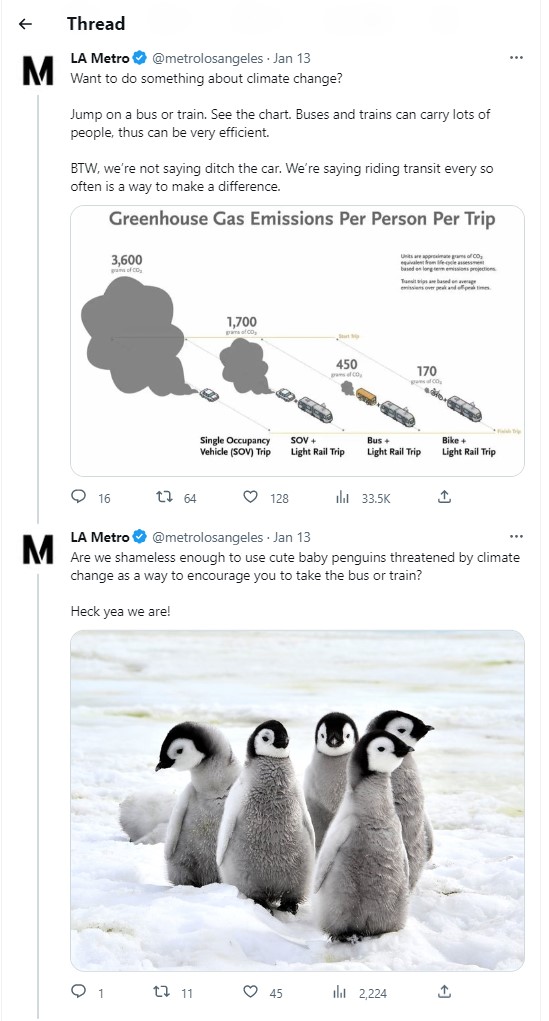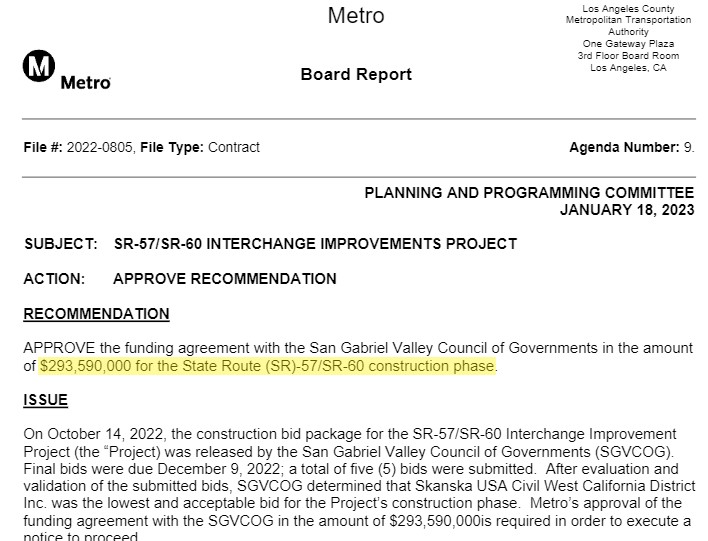Following Metro social media, one would hardly know that Metro spends hundreds of millions every year widening freeways. Metro strives to portray itself as climate-friendly, but, even according to Metro's own accounting, the agency's projects and programs worsen global warming more than they help.
Metro's hypocrisy was especially dismal last Friday.
Metro Twitter was busy telling its followers about climate change (see full thread): "Want to do something about climate change? ...riding transit every so often is a way to make a difference." They even managed three different tweets about charismatic mega-fauna harmed by climate change: polar bears, sea turtles and baby penguins.

What Metro failed to include in the thread was the agency's own massive contributions to greenhouse gas emissions that are worsening climate change.
Metro is currently spending billions of dollars to widen the 5 Freeway (in three places), the 71 Freeway, and the 405 Freeway. Metro is planning many more freeway expansion projects: multiple 605 Freeway projects, multiple 405 Freeway projects, multiple 91 Freeway projects, widening Highway 14, widening Highway 138, widening more of the 5 Freeway where Metro is planning hundreds of home demolitions, and many many more freeway/ramp/road widenings. In recent years, Metro has dramatically increased its annual freeway construction budget. In 2022, Metro decreased its transit construction budget by eight percent while increasing its highway construction by 33 percent.
Metro's own evaluation showed that Metro's freeway building will contribute more greenhouse gas emissions than all of its transit projects combined. Metro found that its own freeway/road expansion initiatives will increase GHG emissions by 2.6-10.1+million MTCO2e (Million Metric Tonnes CO2 equivalents) by 2047, while at the same time its transit initiatives will reduce GHG emissions by 2.7 million MTCO2e.
The very same day as Metro was tweeting penguins, Metro staff recommended the Metro board approve another $300 million dollars for freeway widening.

Specifically, Metro is looking to add one more lane - plus more and wider on- and off-ramps - to the 57/60 Freeway confluence in eastern L.A. County. The Metro board Planning and Programming Committee will vote tomorrow (meeting agenda, 57/60 staff report) on a final $294 million phase of that $400+ million freeway expansion megaproject. The approval before the board would accelerate that highway expansion project two years ahead of the schedule approved by voters.
Metro's whipsaw Friday showcased a common problem with climate messaging: not pointing out systemic change needed, while placing the blame on individual choices. Metro is spending billions of dollars to encourage driving - increasing greenhouse gas emissions. Meanwhile Metro fails to invest enough to make Metro transit service frequent and reliable. Then the agency has the nerve to turn around and tell individuals that it's their decision to ride the bus.
Whose changes can make a substantial difference on climate: an agency with an $8+billion annual budget or an individual transit rider?
If Metro cares about a habitable climate (spoiler: it doesn't - but it should) then the agency needs to make climate justice - including equity - its budgetary priority. Metro should stop spending billions to encourage driving, and should truly prioritize improving transit. The agency needs to go beyond penguins and hypocritical finger-wagging, and really put its money where its mouth is. The magnitude of the climate emergency requires no less.






